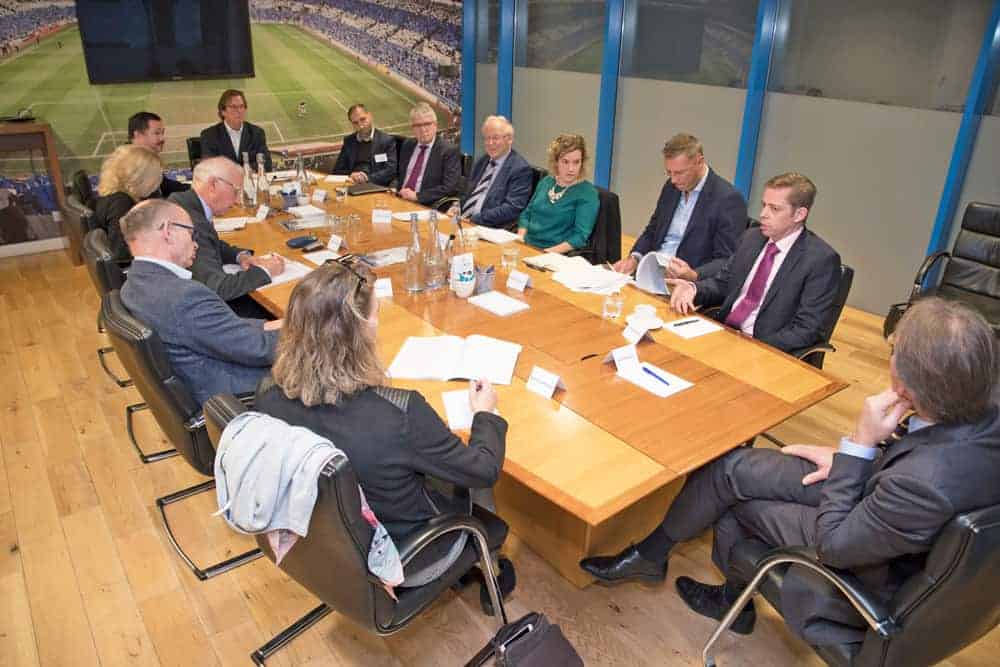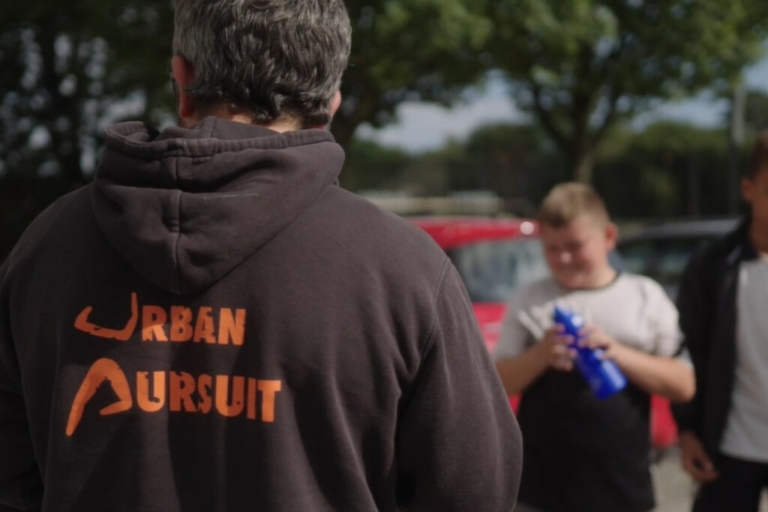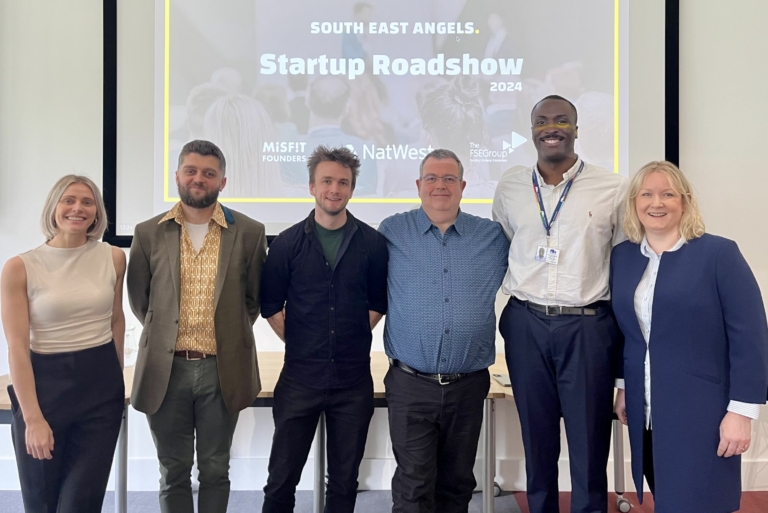A business environment eager to progress from good to great

The Business Magazine and business park owner MEPC hosted this discussion on Oxfordshire, its thriving local economy, its global aspirations, and discovered a business environment eager to progress from good to great.
Government approval of the Oxford and Oxfordshire City Deal provided a New Year boost and significant funding for the region’s future.
The City Deal bid, led by the Oxfordshire Local Enterprise Partnership (LEP) secured £55.5 million of central government funding which will now be used locally through the LEP to boost innovation, business growth and job creation.
Four ‘innovation incubators’ will be established around the county to support spinout companies and those with the potential to grow, innovate and take their products to national and international markets. Road and rail networks are set to be improved along with better public transport links and additional housing.
It has been estimated that the Government’s funding stimulus could be worth £1.2 billion to the region once other predicted investment is factored into the City Deal proposals.
City Deal funding should give Oxfordshire the tools to make the most of its world-renowned science and research, creating jobs and driving the local economy for years to come.
Did the Roundtable agree?
It’s an exciting time for the region
Following the Local Enterprise Partnership’s successful City Deal bid, Nigel Tipple, chief executive of the LEP, was naturally enthusiastic and confident about Oxford and Oxfordshire’s future potential, but harnessing and guiding that potential was now the LEP’s key challenge.
“We recognise that brand ‘Oxford’ has a tremendous wealth of assets and resources. We have been working with businesses like MEPC to strengthen that branded proposition, establishing our attributes and how we translate them into real business growth opportunities. Also, our constraints: whether that’s infrastructure, skills, business support activities or the physical environment, housing, employment, space etc.”
The LEP’s aim is to build on existing aspects of success while turning negatives to positive opportunities. It is doing this through greater negotiation with government, bringing universities closer to businesses, while working with its local authorities in a collective way.
The Government is also keen to invest in proven success, and the City Deal bid had highlighted Oxford and Oxfordshire’s economic potential. “A key regional statistic is unemployment under 1.1% with less than 5,000 receiving Job-Seekers Allowance. That’s as near to full employment as you are going to get in this country.
“We have significant growth potential. We have world-leading, not just world-class, universities and science, biotech and automotive sectors. We’ve got the DiamondLight Source Synchrotron, Big Data and digital clusters, and a real quality of environment for leisure, culture and tourism – overall a great quality of life.”
Innovation-led business growth, particularly for small businesses, was at the heart of the LEP’s successful Oxford and Oxfordshire City Deal which will help establish four innovation hubs along Oxfordshire’s ‘knowledge spine’ – at Harwell and Culham in the south to the life science BioEscalator project at Churchill Hospital in Oxford and the advanced engineering hub at Begbroke in the north.
The City Deal is set to create nearly 19,000 high level jobs and 31,400 in construction. Plans include a raft of business support measures, a £1.5 million investment in skills training and over 500 new apprenticeships. The delivery of 7,500 new homes across the county, accelerated by public and private sector investment, is anticipated.
Business expansion will be supported by major improvements to transport links including the A34 pinch-points and A40 ‘Northern Gateway’ with a new A40 to A44 link road and improvements to the Cuttleslowe and Wolvercote roundabouts. Along with railway improvements, a new Oxford ‘Science Transit’ scheme will provide a high-frequency public transport link along the knowledge spine.
How the Government got to see the Big Picture
“The significant economic shift in our City Deal business case was in demonstrating how to bring those aspects together – the Big Picture: people, place, enterprise and connectivity,” explained Tipple.
The LEP’s City Deal submission was designed to gain support for skills and innovation within all types of Oxfordshire businesses, along with improved transport infrastructure, extra housing, and funding to support the four ‘incubator hubs’.
“Our Big Picture submission was compelling because our businesses, universities, and local authorities got behind it. Government ministers understood it and could retell our story and ultimately we secured £55.5m for the LEP to invest in the region.”
The LEP has also negotiated with government on how local Skills Funding Agency investment (£24m) can be better targeted to business needs – delivering tailored learning through colleges rather than simply delivering standard training modules.
Additionally, Tipple revealed that outside the City Deal, extra Enterprise Zone funding had also been gained for improvements to the A34 Milton and Chilton interchanges. “The message of the City Deal obviously set an economic context that the Government could respond to.”
“Our Bigger Picture narrative is about the whole of Oxfordshire being open for business, and brand ‘Oxford’ applying equally to a local community, university or city business, set within a dynamic culture of growth that allows talented individuals to get from the classroom to, for example, an F1 pit-lane.”
Investment focused on proven success
MEPC’s Philip Campbell commented: “I have worked in commercial property in Oxfordshire for 20 years now. When I first started, county mindset was always, ‘If it’s not broken why fix it? Our local economy is all right, we’ve got lots of eggs in different baskets, things will be fine . . .’ But times are changing and with the introduction of the LEP we have seen a real coming together of people and organisations and there is an appetite now to go from good to great. We should put that old mindset behind us and think instead of ways we can improve things that are good and make them really great.”
The Government had choices when it invested money: either in challenged areas that often deliver little return, or in strong areas that get great returns from relatively small investments. The City Deal support for Oxfordshire was obviously the latter, said Campbell.
Business adviser Steve Clarke added that Oxfordshire’s future was also about inward investment and re-investment.
The LEP had created Invest in Oxfordshire, to deliver a free, confidential and comprehensive inward investment service to potential new companies and an account management service to existing companies.
Organisations such as the Oxford Investment Opportunity Network (OION), one of the UK's first business angel networks, were equally as important to job creation and future progress.
“There is money available for businesses that want to expand, Oxfordshire is in a great position to really kick-on, particularly with the upward change in the economy worldwide. If we don’t take the opportunity now, then we’ve only ourselves to blame.”
Campbell pointed out that when David Cameron (local MP for Witney) became prime minister there were concerns that government support for the Oxford region would reduce for fear of perceived favouritism, but in fact the obvious economic potential of the county had prevailed and the City Deal support was an indication of that accepted understanding.
Tipple agreed: “I believe that Oxfordshire’s strength was echoed by a greater degree of engagement from cabinet ministers in respect to our bid. They could see the potential to invest in success, and generate an exchequer return that could be re-invested in other parts of the UK, as the more compelling argument in an economic climate where we are looking to manage deficit.”
IT business MD Dr Malcolm Newdick mentioned the Government’s award in 2011of an Enterprise Zone to Oxford’s Science Vale at Milton Park and Harwell. “I imagine we got the EZ because that’s where the Government saw the growth coming in the next 10 years or so.”
Can we have our cake. . . and share it with the world?
Andrew Barlow of MEPC spoke about the diversity of Oxfordshire’s offering from automotive to life sciences, spinouts to world-brand companies. “The main cluster of biotech and life sciences seems to be expanding again, and research coming out of our world-leading universities has strong foundations upon which to grow. As an investor, MEPC has a big exposure to that sector, and two years ago we were nervous about the future, but not now following increased demand for laboratory space.”
There were similar positive outlooks within publishing, automotive, IT, and engineering sectors. The key factor, he stated, was providing the right environment for businesses within such sectors to consolidate into mutually beneficial economic clusters, whether their markets involved were local or global.
“In terms of a cake, Oxfordshire has got all the ingredients, but in the past there has not been the appetite to increase the cake, but perhaps we are now seeing that.
“For internal growth we need to provide infrastructure, skills and housing, but as an area we need to promote ourselves to bigger ‘cakes’, be that regionally in the UK or internationally. That should be our aspiration.”
“If you look at it geographically, the competition is not Cambridge and London, it is overseas in global markets.”
UK businesses were now recognising that collaboration with each other could provide a strong ‘Best of British’ narrative within international markets. “We are not playing catch-up and now have a strong economic proposition. We can pitch collaboratively and collectively, supported by the Government’s world-trading message, to promote our proposition globally.”
With Oxfordshire now economically strong, correctly positioning the region internationally was the future challenge – establishing brand ‘Oxford’ as world-leading not just world-class.
David Murray highlighted that Oxford already led the world in academic terms.
How do we gain and retain a skilled workforce?
Having discussed macro-economics, the Roundtable turned to the nuts and bolts of starting and running businesses in the county.
Nikki Godding deals with companies of all shapes and sizes and from a variety of industry sectors in her role with the Business Learning Foundation. With such low unemployment in the county, she evidenced businesses often finding it a struggle to recruit really good people. Twelve months ago it was a different story, she explained.
Locations such as Milton Park were very attractive workplaces, but companies are working hard to retain their talented employees and therefore people are opting to stay in their jobs rather than move to other companies.
Employment lawyer Beverley Sunderland agreed. “Getting good quality people is hard.” Persuading people to move into the county – “finding quality properties at the right price-range etc” – was difficult too. “Yes we can recruit people, but where do they live; where do they bring their families?”
Tipple agreed that supply of housing was an issue, being addressed by the LEP and the local authorities, along with the improvement of travel links. “The A34 is a national arterial connection between Southampton and the Midlands, but also in Oxfordshire, it’s a local distributor road. It was not built for that sort of volume, so we need to improve traffic flow.” Moving freight onto rail was one solution; improving junctions and better management of HGV transport and work-related travel were others.
Careers information and guidance, both at school and university levels, was another concern with budget cutbacks hitting such services. “Young people coming out of education today are not quite sure what a career in science actually means. How does Diamond Synchrotron or the F1 Grand Prix circuit relate to a job they might want?”
The LEP is currently working with companies bringing them closer to schools, he added, aiming to get them to “. . articulate what a career in their sector can actually mean.” For example, BMW MINI is positively promoting female apprenticeships. “Today, it’s not about big spanners and bolting cars together, it’s such a high-tech environment that it’s about quality and intellect, and often soft skills.”
Location, location, location
Oxford’s central location in the UK was also a bonus, said Barlow, since it can attract people from all points of the compass, unlike several of its UK competitors. “With investment in travel infrastructure, journey times can be reduced. We are 45 minutes from anywhere 50 miles away.
“Things won’t happen overnight, and other areas in the UK have similar issues, but we are now well placed to make sure that improvements are made, to ensure our future growth.”
Campbell pointed out that the planned Western Rail Access to Heathrow (WRAtH) would provide journey times from Oxford to Heathrow of 45 minutes, making the county more attractive to international inward investment.
Murray and Tipple both highlighted that the region already had its own airport, London Oxford City Airport at Kidlington.
Sunderland said her company, after studying operational efficiency, had moved away from Reading. “This is an absolutely perfect location for my business. Clients love it. They can easily come to us or we can get to them quickly.”
Technology business chief executive Christopher Willmott revealed that his company’s development team had all previously worked for technology companies in the Oxfordshire region. “For us, it has been fantastic and an attractive resource of really talented skills.”
However, being so close to Oxford’s universities was a twin-edged sword. “My immediate reaction was what a great pool of potential recruitment, but we found that really difficult to source. It’s a dichotomy. You can see the attraction of this area from a work perspective, but you do get the impression that a lot of graduates migrate out of the county rather than staying to work in it. If only we could retain more of that resource.”
The draw of the bright lights…
Clarke: “Any economy within striking distance of London will suffer because of the draw of the City.”
Tipple: “We do need to work closer with the universities and students to better communicate the strength of what is on offer here, particularly where we are comparable to London with the same profile and nature of businesses. We should be attracting them back here too. Maybe we just don’t shout enough about the strong proposition that Oxfordshire has to offer, or act enough as ambassadors when we are out working with other businesses.”
Campbell noted that quite often when high-growth Oxfordshire businesses were taken over, senior staff left but stayed in Oxfordshire to start up new businesses. “Why? Because they know that Oxfordshire is a great place to have a business. What we all need to do is tell everybody that. There are so many local businesses with international links it would be a very simple way to spread the word.”Sunderland: “In the legal profession, it would be unrealistic not to expect young lawyers to want to cut their teeth in London. But if you can imprint on them at university, like a chick coming out of an egg, they’ll know that when they’ve done the bright lights, realise that they need to be at their London desks 24 hours a day and don’t have a life, then Oxfordshire will become attractive. That’s not because it will be second best, but because they can take what they have learnt and bring it back here to make a real difference.”
Murray remarked: “ Work, after all, is a lifestyle choice.”
. . . or the attraction of sustainable living?
Barlow remarked that graduates were not necessarily homegrown talent. “There is a huge talent pool coming out of the Oxford universities, but the students don’t normally come from Oxford. It is not home to them, so we can’t expect them all to stay after three years of study.”
They seem to achieve it in university cities like Sheffield, Manchester and Leeds, mentioned Tipple. He emphasised the need to “anchor talent to Oxford” in some way, to message “the dynamic of Oxford growth” while providing attractive housing, salaries, transportation and lifestyle. He highlighted the Bicester eco-village development which will provide 5,000 homes and is designed to enable residents to live a zero carbon, green lifestyle and get around easily without the need for car journeys.
Campbell: “We have a high proportion of people who actually live and work in the county. We just need to find ways of making Oxfordshire more attractive and ‘sticky’ for graduates and the like.”
Is good placement the answer?
Newdick said his company had a student placement for a year in 2006, but there was no follow up from the university. “I was surprised, because it seemed to work for everyone.” He admitted that his company’s own connection with the Oxford universities was weak. “There should be stronger links within the business sector, but I don’t get a sense of integration or that there’s a natural place to go to find graduates.”
Tipple mentioned how West Country talent was retained through a well-established student placement scheme – ‘Unlocking Cornish Potential’ – between local businesses and the combined Cornish universities. “Through such placements it’s created a connection between businesses and student opportunities, which has built up over the years.” He felt the Oxford universities were now realising that they had to “open doors and look out rather than simply deliver the university agenda.”
Godding revealed that her previous Oxford employer had regularly taken on student placements. But, while they had applied to the Oxford universities, the placements actually came from Bristol, largely due to their courses accommodating a mid-study placement. “I hired placements for three years in a row, and I estimate 50% of those students are still with the company.”
Clarke mentioned James Cowper’s recent student placements had come from Bath or Bournemouth.
Anthony Foxlee-Brown said Grundon had an Oxford Brookes placement student currently working within its operations, and was aiming to recruit another at the end of her year, but as a company it would welcome stronger links with the Oxford universities.
Commenting on a 2013 report on the value of business clustering within Oxfordshire, Campbell recalled a conclusion: “It is really important for a cluster to have a successful university, but it is really important for a university to have a successful cluster.”
The Roundtable agreed that more needed to be done to develop student placement, graduate retention and worthwhile work experience programmes, through greater collaboration between the education and business sectors.
Join the ex-Army recruitment drive?
Although Grundon required graduate level employees for scientific roles, notably chemists for its technical division, the company currently had a problem recruiting blue-collar staff, Foxlee-Brown revealed. Grundon’s success had led to the need for more logistics staff, particularly LGV drivers. “There’s a lot of competition for logistics jobs in Oxfordshire, due to the county’s success in attracting logistics business to the area and we are finding recruitment difficult, despite offering free driver training to upskill people.”
Tipple suggested changes within MOD personnel numbers at Carterton, Brize Norton and Shrivenham, might provide an Oxfordshire opportunity for Grundon. “There are substantial numbers of logistics service personnel coming out of mainstream armed forces work who need modular training to translate what they already have in military abilities into something marketable in commercial terms.”
Barlow mentioned that Milton Park had an ex-Army Logistics Corp employee. “These guys are highly skilled and get things done.”
Tipple: “These skills are embedded and quite often it is simply a matter of providing some ‘transfer support’ into civilian life.”
“Who provides that support?” asked Murray.
Some of it came from the MOD said Tipple, but the LEP was currently developing, with the support of the county council, a programme looking at the profile of the available service staff, the market opportunities, and the skillsets or qualifications required to help them transfer. “We are working with the universities and colleges across Oxfordshire to develop suitable support.”
As a training provider, Godding confirmed that she had seen an increase in armed forces personnel enrolling for training courses.
Sunderland, from an Army background, said that the MOD generally provided time and money to demobbed service personnel, enabling them to undertake suitable courses for their chosen civilian career.
Tipple admitted that still happened, but the LEP was trying to turn that military process into a career path opportunity for both the service personnel and Oxfordshire businesses.
Campbell noted that with their families now based locally, service personnel would probably want to stay in the county rather than move children out of schools, etc.
Is there adequate growth funding for Oxfordshire businesses?
Willmott, whose business from start-up relied on external funding, said: “I don’t know what it is about this region but there appear to be many individuals and angel investors around Oxfordshire who are prepared to consider different types of business plans. We haven’t needed to go to any banks or financial institutions for funding, and I’m sure if we had, it would have been very much more time consuming.”
Clarke confirmed the recent growth in non-bank funding, but noted that Oxfordshire had a long-established ‘angel’ community through such investors as The Oxford Trust (founded by Sir Martin and Lady Audrey Wood), OION, Isis Angels Network and venture capital trusts offering seed capital. “Entrepreneurs who are successful and make money are often quite keen to invest again and offer their skills to the businesses they invest in. We are quite lucky to have that spirit here.”
But, the county had other sources of funding. The Government’s Regional Growth Fund had assisted initiatives at Harwell such as the Space Applications Catapult, and a lot of technology businesses had been helped through the Technology Strategy Board. “The mix of angel and government funding has in reality been a cornerstone of Oxfordshire’s technology business success,” admitted Clarke.
“Keeping that and encouraging it will be fundamental to our continued success,” echoed Willmott.
Tipple pointed out that such funding was seen as an investment not a free grant. “It’s a subtle difference, which gives a real business imperative to make that investment work.”
The LEP was looking at ways of introducing mixed investment funding options – with possibly banks, angels, and the Government jointly involved – to change the overall risk profile of investment in order to fund future technology and innovation. Proof of concept investment, tailored skills and training schemes, and sector-networking support might come under such funding.
“It’s about strengthening a business to give it the credibility to be able to pitch for a more traditional funding source.”
Campbell noted that “Oxfordshire life science companies are absolutely at the top of the graph when it comes to securing funding. We’ve seen some big announcements recently. It will be really interesting to see how that funding translates into business growth and more employment.”
As a legal adviser to businesses, from start-ups to major brand names, Sunderland admitted she would not know who to tell clients to go to for funding advice.
“Give us a few more weeks,” said Tipple. The LEP will be setting up an Oxfordshire web-based portal – www.OxfordshireBusinessSupport.co.uk – with a full range of support facts and contacts, including funding advice.
Helping start-ups overcome teething problems
Murray queried if the recession had harmed the progress of Oxfordshire start-ups.
Tipple didn’t think so. Larger companies had been hit, but many like BMW MINI had simply made their operations more efficient or invested in new equipment.
Clarke: “It had a fairly significant effect in 2008/9 depending on what industry you were in. Construction for example suffered far more than IT, but actually, if you were a start-up tech business and you had just raised two years of money what difference did it make?”
The region had “bubbled along during the recession”, said Barlow, growing slowly and was one of the few UK locations that was a positive net Gross Value Added (GVA) generator to ‘UK plc.’
Campbell revealed that during the recession only one company at Milton Park had gone into administration out of 230 businesses on the site.
Clarke: “We talk about global SMEs these days because the moment a tech business starts up it is by nature an international business. Successful SMEs and spinouts are all over this county and certainly well represented here in Milton Park. They just need the right level of advice and support to build their business.”
Tipple: “We produce a huge amount of talent and spin-out opportunities, but how do we facilitate them turning into world-leading companies like Oxford Instruments?”
With the Roundtable being held in the Milton Park’s Innovation Centre, Murray invited Barlow to explain what MEPC was doing to help start-ups.
“We provide an easy-in easy-out, single-bill serviced office offer, with a communal space to network and make contacts with other entrepreneurs. It’s all about creating the right dynamic but flexible environment where companies can thrive. People can come and be set up in a day; leave within a month or grow over time.
“This is all part of our overall provision of all types of space for the right markets. Our Science Centre, for example, will have the same flexible offer but with fitted laboratories.”
Campbell added: “MEPC took the decision to base itself in its own Innovation Centre because we want to help start-ups to grow and be successful. We have good real estate and business connections across the country. So, we are directly on hand should anyone have a question to ask. We are an extended intermediary if you like.”
Innovation centre resident Sunderland commented: “It is a real positive having MEPC here.”
With a smile, Campbell provided some advice for start-ups: “Reach for the stars. You may not get what you want, but you won’t end up with a handful of mud.”
Building aspiration
Newdick asked the Roundtable to ponder why ‘UK plc’ remained a nation of shopkeepers by repute and with such a huge number of SMEs by nature. “The mystery to me is why so many businesses stay as sub-five employee organisations? Is it poverty of aspiration? My company is aiming for a £6m turnover at the moment, but I wonder why we’re not aiming for £60m. At what point is it decided that your business is big enough? Why does UK ambition plateau?” queried Newdick.
Lack of planning, low confidence or fear of failure came the Roundtable answers.
Willmott wasn’t sure poverty of ambition was evidenced in Oxfordshire, but he felt lack of ambition was more likely in bigger business than among SMEs. “Today, the real ambition for growth, innovation and exciting developments is in small businesses and from the British economy perspective there is real potential and excitement. What I see on the ground around here is phenomenal.”
Tipple suggested that lifestyle choice had a key bearing on ambition thresholds. Once people have enough money for their chosen lifestyle, they are no longer so hungry. But, dynamism in an area, such as in Oxfordshire, could heighten aspirations.
Participants
Andrew Barlow: Commercial director, MEPC
Philip Campbell: Head of leasing and development, MEPC
Steve Clarke: Managing partner, James Cowper LLP
Anthony Foxlee-Brown:Marketing communications manager, Grundon Waste Management
Nikki Godding: Sales and marketing director, Business Learning Foundation
Dr Malcolm Newdick: Managing director, Riverbank IT
Beverley Sunderland: Director, Crossland Employment Solicitors
Nigel Tipple: Chief executive, Oxfordshire LEP
Christopher Willmott: Chief executive, Sprint Enterprise Technology
David Murray: Managing editor and publisher of The Business Magazine, chaired the discussion













